
Introduction
In the cryptocurrency market, many people have the inherent impression that Japan is closed and independent, and its presence is not always strong, making it easy to overlook. In comparison to other markets in the Asian region, Singapore, Hong Kong, and South Korea are more frequently mentioned and focused on.
However, as the world's third-largest economy and a region that established the status of cryptocurrencies early and formulated regulatory frameworks, Japan has unique advantages and market characteristics. With the government vigorously embracing cryptocurrencies and promoting industry development, new changes and opportunities are gradually emerging.
1. Macroeconomic Indicators and Current Situation
Japan has a strong and well-developed financial system, which has laid a solid foundation for the development of blockchain and Web3 technologies in the country. When discussing the cryptocurrency market in Japan, regulation becomes a key focus.
The country maintains strict regulatory measures to maintain investor stability, market security, and overall integrity. Although these regulatory measures are aimed at protecting the industry, the complexity of compliance with cryptocurrency-related earnings and high tax burdens may pose obstacles to the entry and expansion of smaller cryptocurrency enterprises. In addition, the lengthy token listing approval process may lead to a perception of reduced market activity.
1.1 Geographic Location and Population Size
Japan is an island nation in East Asia, located in the northwest Pacific Ocean as part of the Ring of Fire, spanning a group of 14,125 islands, with the five main islands being Hokkaido, Honshu ("Mainland"), Shikoku, Kyushu, and Okinawa, as well as nearly 4,000 smaller islands. Japan is closest to the Russian Siberian region, while South Korea and China are located further south. Tokyo is the capital and largest city of the country, followed by Yokohama, Osaka, Nagoya, Sapporo, Fukuoka, Kobe, and Kyoto.
According to United Nations data, Japan has a population of nearly 125 million, with nearly 122 million being Japanese nationals (estimated in 2022), accounting for 98.1% of the total population, with the remaining portion being minority foreign residents, including indigenous Ainu people, Ryukyuans, Koreans, Chinese, Filipinos, Brazilians of mostly Japanese descent, and Peruvians of mostly Japanese descent.
Japan is the country with the fastest aging population in the world, with the highest proportion of elderly people among all countries, accounting for one-third of its total population, accompanied by an increase in life expectancy and a decline in birth rates. Japan's total fertility rate is 1.4, which is lower than the replacement rate of 2.1, ranking among the lowest in the world; the median age is 48.4 years, the highest in the world. The Japanese government estimates that by 2060, there will be one elderly person for every working-age person. Immigration and incentives for childbirth are sometimes suggested as solutions to support the aging population of the country.
1.2 Economic Structure and Characteristics
Japan is the world's fourth-largest economy, following the United States, China, and Germany (Germany surpassed Japan to become the third-largest economy in 2023), with its economy mainly composed of the service industry, manufacturing, and import-export business. Japan's economic characteristics reflect its high degree of industrialization, strong external dependence, and unique economic structure and organizational forms of enterprises:
- The service industry accounts for about 70% of Japan's gross domestic product (GDP), known for wholesale and retail trade, real estate services, and professional, scientific, and technical activities.
- It has a high degree of industrialization, leading in the global electronics and technology fields, with agriculture not playing a major role.
- It is primarily focused on processing trade, importing raw materials and fuel, and exporting products to expand into international markets, making it the world's fifth-largest exporter and fourth-largest importer.
- The industry is mainly concentrated in the narrow coastal areas along the Pacific Ocean and the Seto Inland Sea, facilitating the import of raw materials and the export of products.
- Manufacturers, suppliers, and distributors are closely integrated, forming strong business alliances with close teamwork.
- Its distinctive features include a seniority-based promotion system and lifetime employment, making it difficult for foreign or new enterprises to enter the Japanese market.
In addition, demographic changes have a significant impact on its economy. Japan faces issues such as a declining proportion of the labor force, aging population, and declining birth rates, leading to a decrease in housing demand, suppressed capital accumulation, reduced investment returns, and subsequently affecting economic activities and innovation.
1.3 GDP Ranking Overtaken by Germany
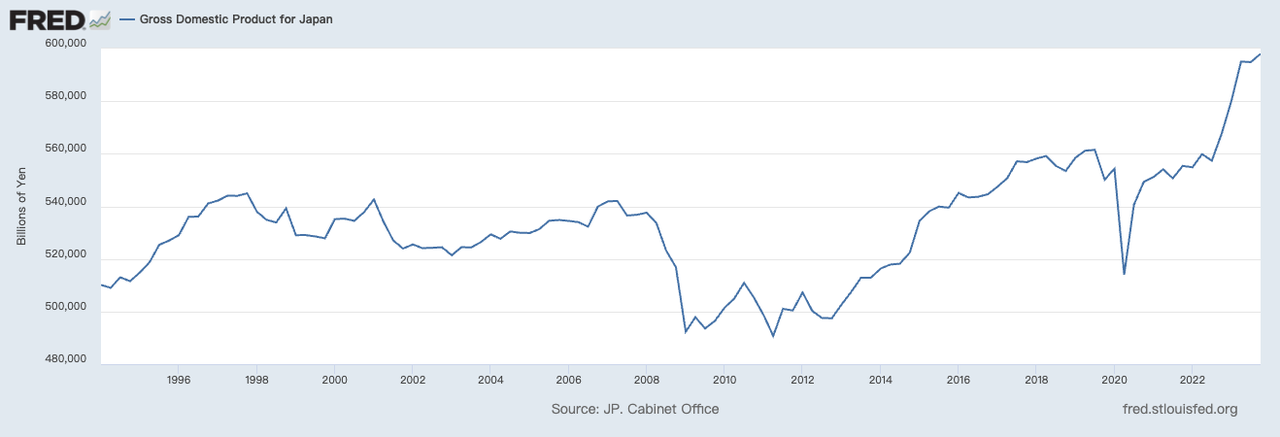
According to a report by Kyodo News on February 15, 2023, Japan's nominal gross domestic product (GDP) in 2023 was $4.2106 trillion, lower than Germany's $4.4561 trillion, dropping to the world's fourth position. Japan's loss of the status of "world's third-largest economic power" is not accidental, but rather the inevitable result of its long-term lack of stable growth momentum. In October 2023, the International Monetary Fund (IMF) had predicted that Germany would surpass Japan in nominal GDP in 2023. Therefore, when this result was officially released, it did not cause much public outcry or backlash, and Japanese society seemed to accept this result calmly.
Japan's long-term lack of stable growth momentum is the deep-seated reason for its nominal GDP being surpassed by Germany in 2023, and finding long-term growth momentum to drive Japan's economic development may have become an urgent task for the Japanese government. If the economy continues to stagnate in the next three to five years, this will become a real problem for Japanese society.
1.4 Inflation Rate Data
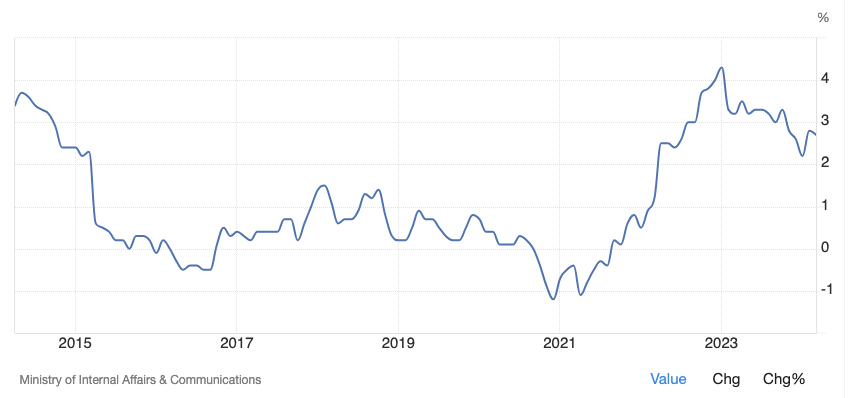
In March 2024, Japan's annual inflation rate decreased from a 3-month high of 2.8% in February to 2.7%, consistent with market expectations. Prices for transportation (2.9% vs. 3.0% in February), clothing (2.0% vs. 2.6%), furniture and household goods (3.2% vs. 5.1%), healthcare (1.5% vs. 1.8%), communication (0.2% vs. 1.4%), and culture and entertainment (7.2% vs. 7.3%) slowed down. Meanwhile, the inflation rates for food (4.8%), housing (0.6%), education (1.3%), and other items (1.1%) remained stable. At the same time, the price decline for fuel and light sources was the smallest in the past year (-1.7% vs. -3.0%), with a slowdown in the decline rates for electricity (-1.0% and -2.5%) and natural gas (-7.1% vs. -9.4%).
The Bank of Japan ended its negative interest rate policy last month, breaking free from a decade-long super loose monetary policy. The market is looking for clues as to when the Bank of Japan will raise interest rates again. The Bank of Japan stated that achieving a benign cycle of continuously and steadily achieving the 2% price target and strong wage growth is crucial for policy normalization.
At the same time, the Bank of Japan will focus on whether service prices will rise along with wage growth. This year, Japanese corporate wages saw the largest increase in 33 years, but after adjusting for inflation, real wages have been declining for the past two years. A Japanese Ministry of Internal Affairs official pointed out on Friday that the impact of recent wage increases has not yet been reflected in service prices.
1.5 Japan's Legal Tender
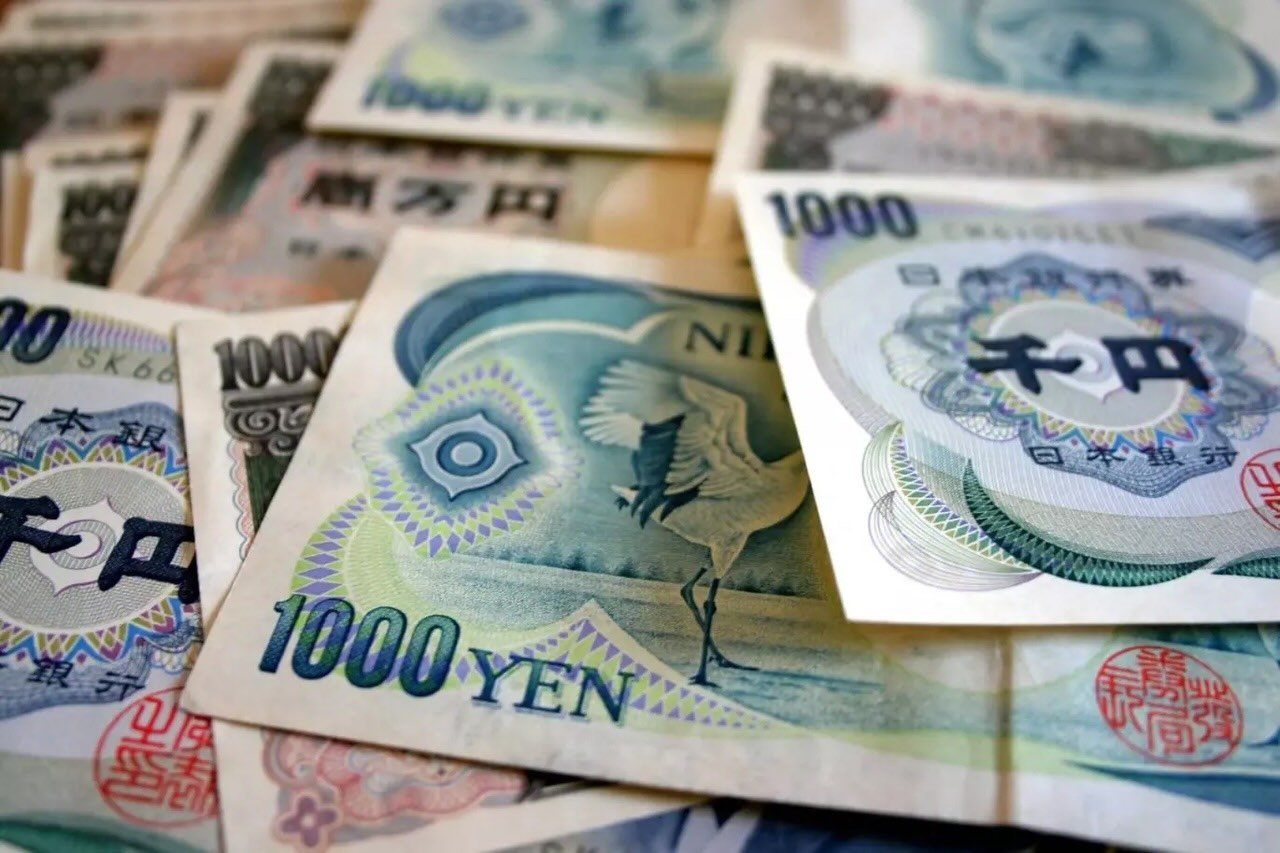
The yen (Japanese: 円, Japanese Romanization: en, English: Yen), whose banknotes are called Japanese banknotes, is the legal tender of Japan and is often used as a reserve currency after the US dollar and the euro. The yen was established on May 1, 1871, and the banknotes in circulation include four denominations: 1000, 2000, 5000, and 10,000 yen, while there are six denominations of coins: 1, 5, 10, 50, 100, and 500 yen.
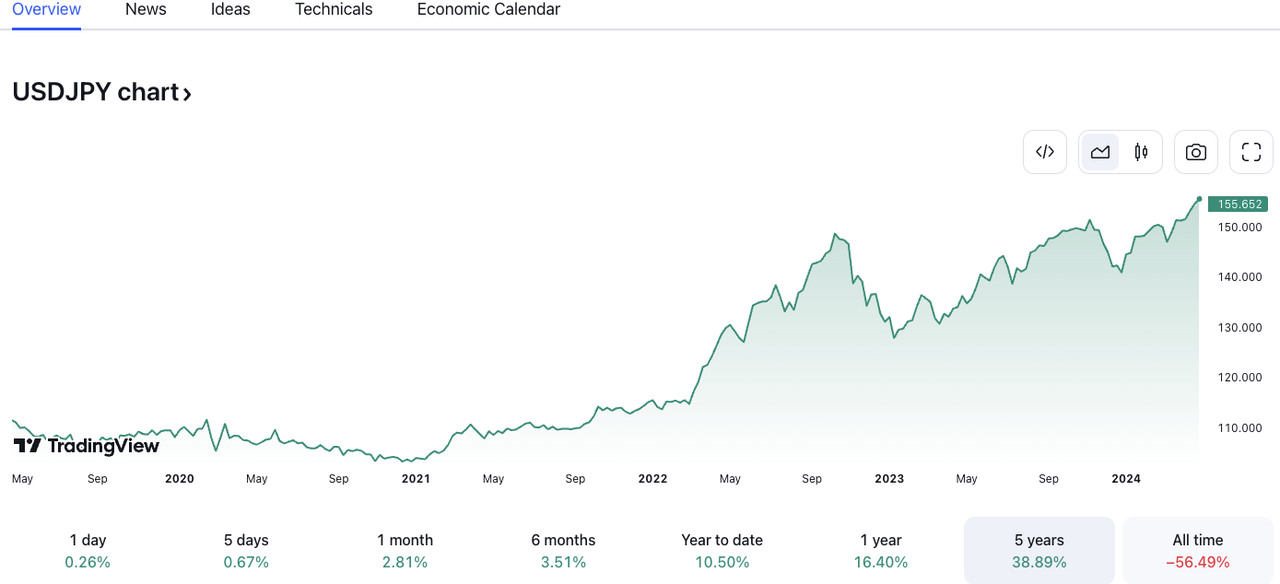
What is particularly special is that the issuer of Japanese banknotes is the Bank of Japan ("Bank of Japan - Banknotes"), and the issuer of Japanese coins is the Japanese government ("Japan"). In addition, Japanese coins do not have unlimited legal tender capability, so the maximum legal use limit for the same denomination coins in a single transaction is 20 coins (i.e., the maximum payment capacity of coins in a single transaction is 1 yen × 20 coins + 5 yen × 20 coins + 10 yen × 20 coins + 50 yen × 20 coins + 100 yen × 20 coins + 500 yen × 20 coins = 13,320 yen). Merchants have the right to refuse to accept the excess amount in accordance with the law.
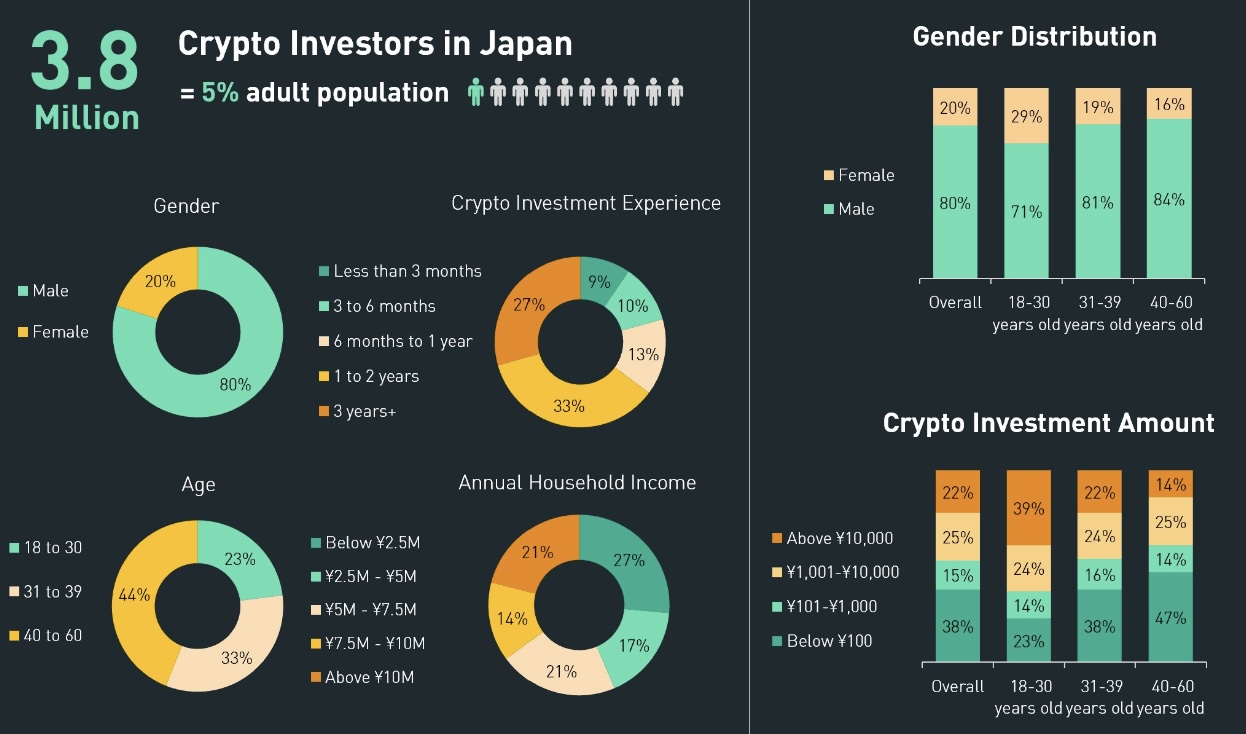
Despite the active interest rate hikes by the Federal Reserve and other central banks in 2022 and 2023 to curb inflation, the Bank of Japan has maintained interest rates at zero and continued to print a large amount of legal tender. In 2023, Japan's core inflation rate rose by 3.1%, marking the largest increase since 1982.
Inflation has weakened the purchasing power of legal tender and prompted investors to allocate funds to alternative assets with value storage appeal, such as Bitcoin and gold. Unless the Bank of Japan accelerates the exit from its super-loose monetary policy, the US dollar will continue to appreciate against the yen, making it more attractive relative to other assets.
2. Current Situation and Characteristics of the Cryptocurrency Market
Japan has been actively nurturing the web3 industry, with the government releasing a web3 white paper, reforming taxation, and attracting investment. The Japanese government has also announced a five-year policy for the development of startups, aiming to increase the number of Japanese startups to 100,000 within five years and invest approximately 10 trillion yen to create 100 unicorn companies.
2.1 Strong Government Support for Blockchain Development
The Web3 project team of the ruling party in Japan released a white paper on April 6, 2023, viewing Web3 as a national strategy. As a result, the Japanese government has invested a significant amount of resources in promoting the research and application of blockchain technology. For example, the Japanese Cabinet Office has established multiple special funds to support the innovation and practical application of blockchain technology. Additionally, the Japanese government is actively promoting international cooperation, exchanging and collaborating with other countries on the establishment of standards for blockchain technology and regulatory frameworks.
The application of blockchain technology in Japan covers various aspects, such as real estate registration, identity authentication, interbank clearing, Bitcoin insurance, and supply chain finance. Here are some specific cases:
- Real Estate Registration: The Japanese government plans to integrate the national real estate data, approximately 230 million land plots and 50 million buildings, into a single blockchain ledger to improve the visualization, accuracy, and security of the data. The project is currently in the testing phase and is expected to be completed within the next five years.
- Identity Authentication: The Financial Services Agency of Japan (FSA) has developed a blockchain platform that allows customers to share personal information among multiple banks and financial institutions and open accounts using a shared ID. In addition, SoftBank Group has partnered with TBCASoft to launch a blockchain-based identity identification and verification project, using zero-knowledge proofs and distributed ledger technology to protect personal identity information from theft.
- Interbank Clearing: Fujitsu, in collaboration with the Mizuho Financial Group, Sumitomo Mitsui Financial Group, and Mitsubishi UFJ Financial Group, has developed a peer-to-peer remittance service using blockchain, improving the efficiency and security of remittances.
- Bitcoin Insurance: Due to frequent hacking attacks on Bitcoin exchanges resulting in customer asset losses, Mitsui Sumitomo Insurance in Japan has launched a Bitcoin insurance product in partnership with bitFlyer, providing compensation for Bitcoin assets and covering losses caused by internal incidents and employee misconduct.
- Supply Chain Finance: Mizuho Bank and IBM Japan have jointly developed a blockchain trade finance platform, enabling fast and secure digital transaction documents and the exchange of supply chain transaction data, while enhancing the transparency and credibility of all parties involved in the transactions.
2.2 Web2 Giants Enter the Cryptocurrency Industry
Investments in the Japanese cryptocurrency industry are often dominated by existing Web2 giants such as securities companies, telecommunications companies, and distributors, rather than venture capitalists (VCs) specializing in web3 investments. The Japanese Web2 giant SBI Group has entered the cryptocurrency industry through joint ventures and subsidiaries:
- SBI Digital Asset Holdings: Securities token services
- SBI VC Trade: Cryptocurrency trading services
- SBINFT: NFT business
Other companies that have established and developed subsidiaries and joint ventures specifically for the cryptocurrency industry include:
- NTT DoCoMo (Japan's largest telecommunications company): NTT Digital
- Sony (a leader in the electronics and entertainment industry): Sony Network Communications Inc.
- SoftBank and LINE: Z Venture Capital
2.3 High Popularity and Potential of GameFi and NFT
Due to policy restrictions, Japan cannot directly invest in tokens and issue tokens, which limits the development of DeFi within Japan. Therefore, in Japan, NFTs and blockchain games are widely considered the main participants in its cryptocurrency market.
Japan has a globally influential gaming industry and is one of the countries with the highest per capita profits in the global gaming market. Its gaming industry has a long and rich history, providing a solid foundation for the development of blockchain games. Japanese gamers are known for their willingness to pay for high-quality games, and their passion for gaming makes the Japanese blockchain gaming market highly profitable.
Japan not only has a rich and long-standing foundation in video game history but also has the most intellectual property (IP) in the world, including anime, manga, and video games, which have transcended national borders and become globally renowned. As a result, the NFT community in Japan also has unique aesthetic views and preferences that differ from other regions in the world. Additionally, Japan's hotspots are sometimes not synchronized with the rest of the world, leading to a certain degree of mismatched delays. Previously, there was a wave of various NFTs in Japan after the NFT craze in China and the US had passed.
2.4 Market is Easy to Defend and Difficult to Attack, with Strong Localization Sentiment
The Japanese market is relatively independent and closed, making it difficult for cryptocurrency projects to market in Japan due to language barriers (Japanese people's psychological barriers to English) and the cautious tendencies of Japanese KOLs. Overall, it belongs to the type of market that is easy to defend and difficult to attack. The localization sentiment of Japanese cryptocurrency users is very strong. However, due to the malicious harvesting behavior of some local projects, people's sentiments towards local projects are becoming complex. Although they still tend to support domestic projects, it is evident that there is a lack of confidence.
Compared to local projects, local users are not very enthusiastic about foreign projects. Overseas projects need to adapt their products and services to local regulations, translate information into Japanese, and collaborate with local KOLs and media, as well as hold local events to gain more visibility and users through contact with localized audiences.
It is worth noting that Japanese users have a mindset of actively considering the interests of project parties and merchants. For example, when merchants set low prices, they consider whether the merchants can recover their costs, showing understanding and tolerance if cryptocurrency projects are actively working, which helps create a more positive community atmosphere.
3. Characteristics of Cryptocurrency Users
According to the TripleA agency, over 5 million people, accounting for 4.0% of Japan's total population, currently own cryptocurrencies. This figure has been verified by data from licensed exchanges. In addition, a report from KuCoin in May 2023 showed that there are approximately 3.8 million cryptocurrency investors in Japan who have owned or invested in crypto assets in the previous six months, accounting for about 5% of Japan's adult population. In Japan, while BTC and ETH are still the favorite crypto assets for investors, there is a great interest in diversifying into various areas such as NFTs, metaverse, stablecoins, public chains, DeFi, and meme coins.
Male Investors Far Outnumber Female Investors
Overview of Japanese Cryptocurrency Investors and Investment Experience

Based on an understanding of various regional markets, men show a higher interest in cryptocurrency investment. However, this phenomenon is most pronounced in the Japanese market, where 80% of investors are male, and only 20% are female investors.
Unlike several other markets, the majority of cryptocurrency investors in Japan are over 30 years old, accounting for 77%. On the other hand, the younger generation aged 18 to 30 represents only 23% of cryptocurrency investors in Japan.
Additionally, the maturity of cryptocurrency adoption in Japan is relatively high. Among surveyed investors, 27% have been investing in cryptocurrencies for over 3 years, 33% for 1-2 years, and only 9% of respondents have recently started exploring crypto assets.
Cryptocurrency investment is also more common in lower-income households, with 44% of investors having a household annual income of up to 5 million Japanese yen. However, only 21% of cryptocurrency investors in Japan have an annual income exceeding 10 million Japanese yen.
Young People Have More Faith in the Innovative Potential of Cryptocurrencies
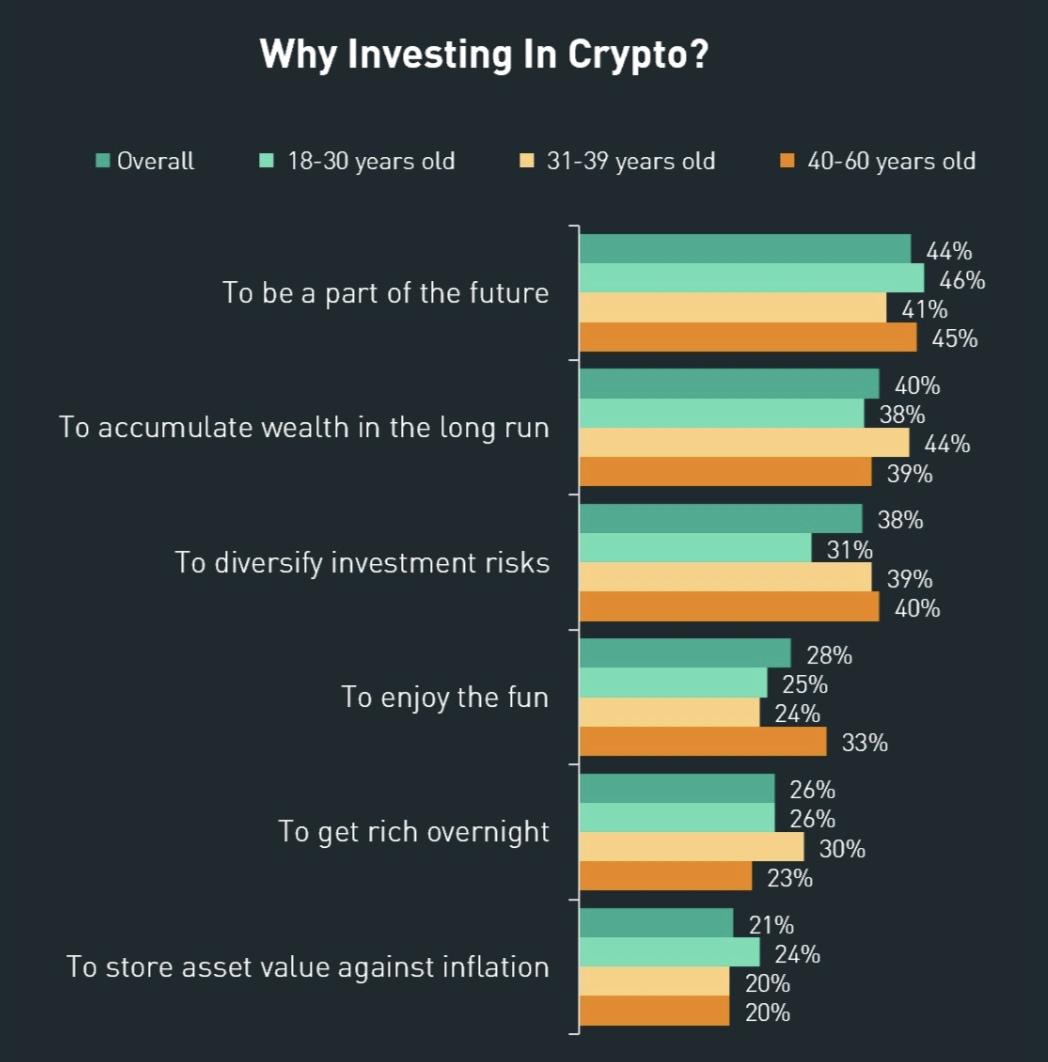
Other major reasons Japanese investors turn to cryptocurrencies include long-term wealth accumulation (40%) and diversification of investment risks and portfolios (38%). While 28% of investors participate in cryptocurrencies because they find it interesting, 26% believe it can lead to overnight wealth. Only 21% of Japanese cryptocurrency investors consider crypto assets as a hedge against inflation.
Among them, 44% of investors believe that investing in cryptocurrencies can grasp the future, with the largest group in this category being investors aged 18 to 30, who invest in cryptocurrencies because they believe in their cutting-edge technology and financial innovation potential.
Overall, Trading Frequency is Low, Especially for Investors Over 40
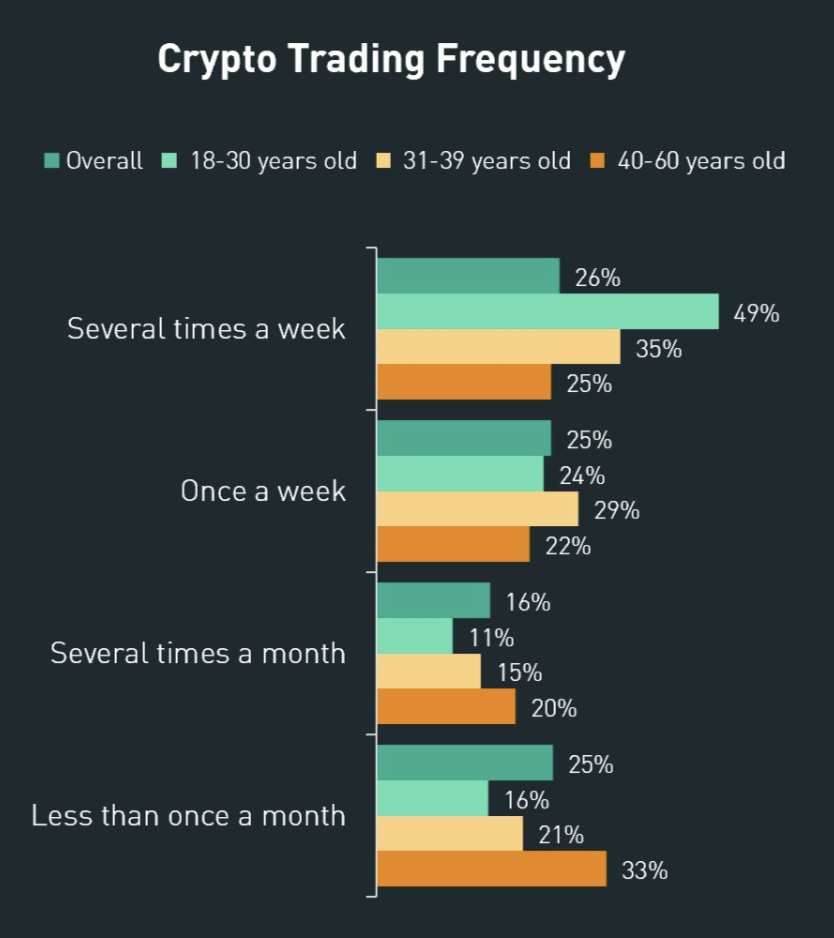
There is a strong correlation between trading frequency and age. Young investors in the 18-30 age group are the most active, trading every week. Users aged 40-60 trade an average of once a month, while users aged 31-39 do not show a distinct pattern, with some trading weekly, multiple times a week, or multiple times a month.
Investors Over 40 Prefer BTC and ETH
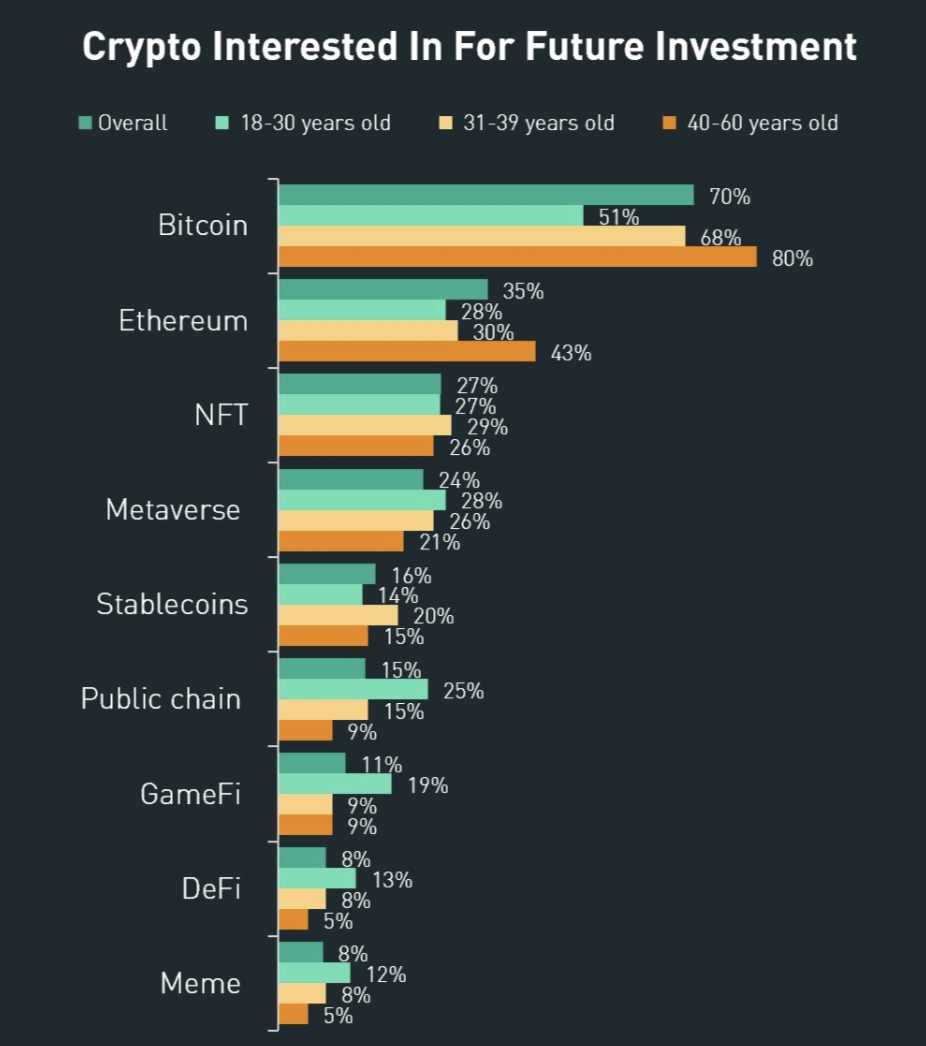
Similar to other regional markets, BTC and ETH have the highest allocation in the investment portfolios of Japanese users across all age groups. Investors aged 40 to 60 are particularly interested in these cryptocurrencies, with 80% of investors expressing interest in Bitcoin and 43% in Ethereum.
Other popular categories favored by Japanese investors include: NFTs (27%), Metaverse (24%), stablecoins (16%), and public chain projects (15%);
In addition, GameFi (11%), DeFi (8%), and meme coins (8%) are gradually becoming popular choices for Japanese users' crypto investments;
Social Media is the Primary Channel for Understanding Cryptocurrencies
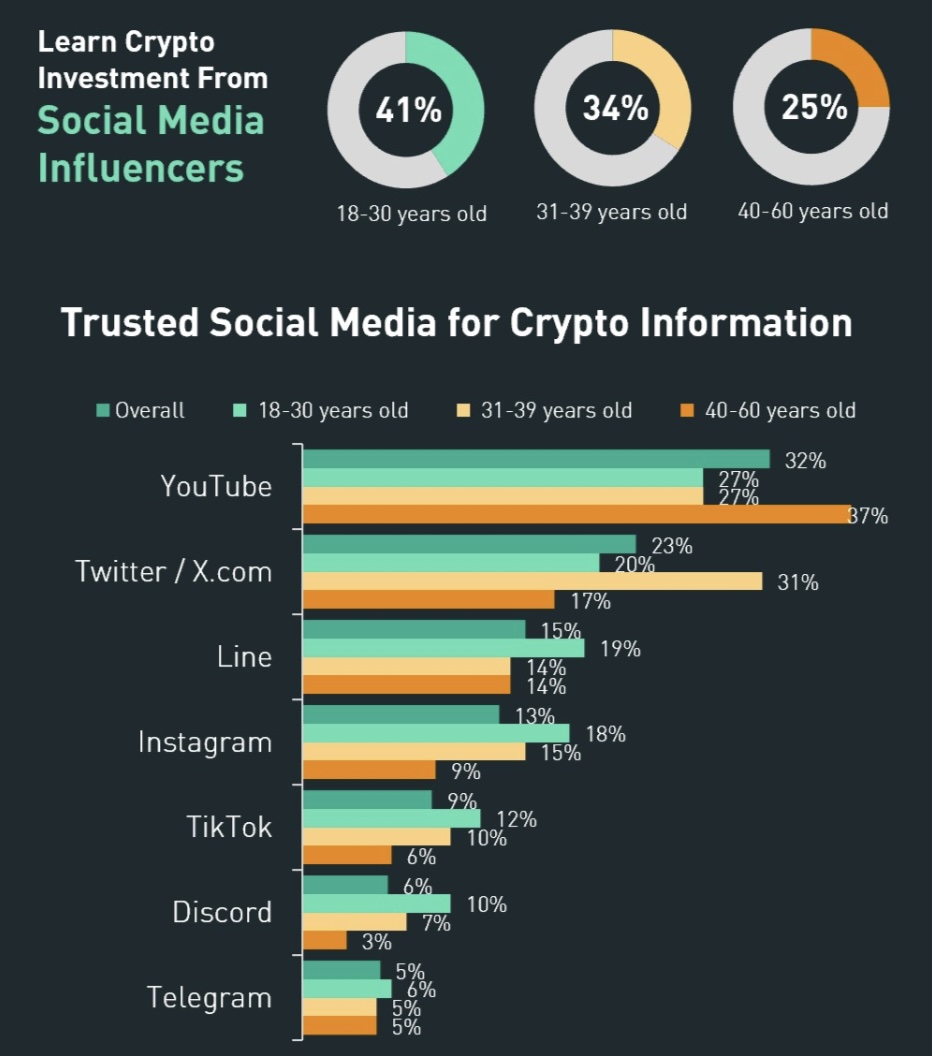
Most Japanese investors learn about cryptocurrencies through social media and KOLs, with this trend being most prominent among the younger demographic, where 41% of investors aged 18-30 rely on influential individuals to understand cryptocurrency investments.
The social media platforms trusted and used by people include: YouTube (32%), Twitter (23%), Line (15%), Instagram (13%), and TikTok (9%). Data shows that more technical social channels such as Discord, Telegram, and Reddit are not trusted by Japanese users, who perceive these channels as having higher risks.
4. Current Status of CEX in Japan
In accordance with local regulatory requirements, cryptocurrency exchanges need to obtain approval from the Japanese Financial Services Agency (JFSA). Most licensed cryptocurrency exchanges are registered in Tokyo or Osaka.
Binance Japan Known for Diverse Token Types
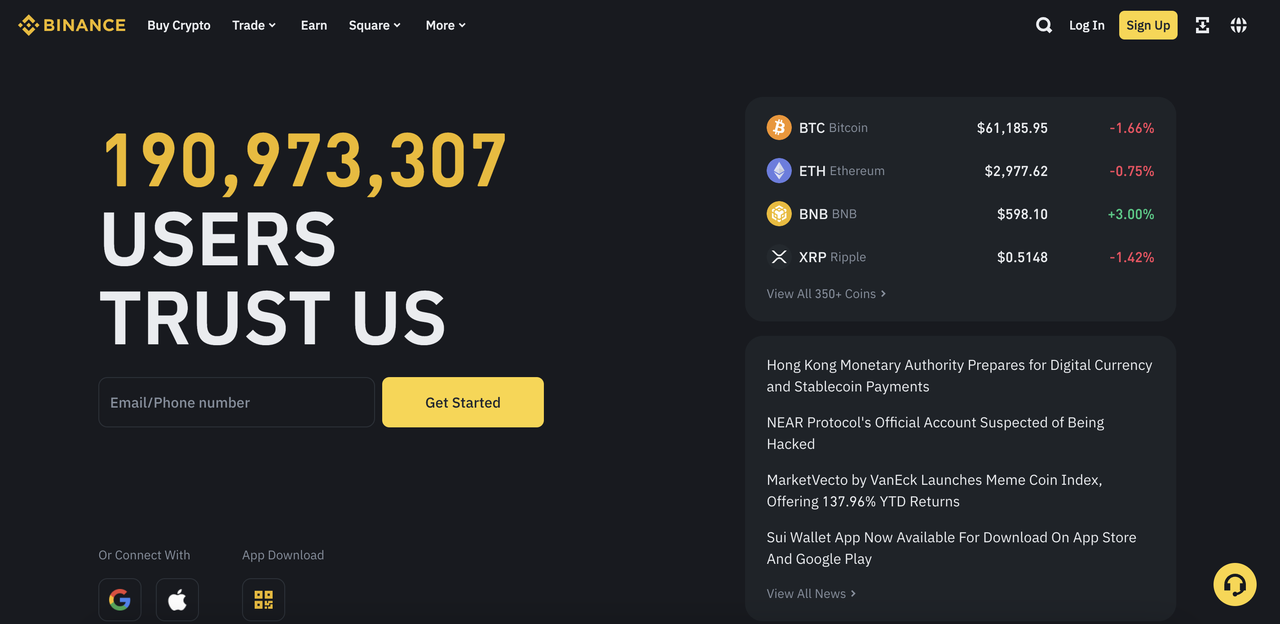
Binance Japan, launched in August 2023, was renamed after Binance acquired the locally licensed CEX Sakura Exchange BitCoin in November 2022. This marks Binance's return to the Japanese market, after the country's financial regulatory authority issued a warning in 2021 for operating without a license. Binance Japan is known for its diverse range of token types and is popular among many users.
Bybit Fully Meets the Preferences of Japanese Investors

Bybit, with custody of over 1,000 cryptocurrencies and a secure platform compliant with strict Japanese regulations, facilitates seamless entry into cryptocurrency trading. It offers direct local yen deposit options, including bank transfers, JCB cards, and Line Pay, simplifying investment pathways.
Bybit's competitive advantages include low trading fees (starting at 0.01% for market makers and 0.06% for takers), abundant liquidity, a daily trading volume of over $30 billion, and a vibrant community of over 20 million users, confirming its market-leading position.
Coincheck User-Friendly Interface with No Trading Fees
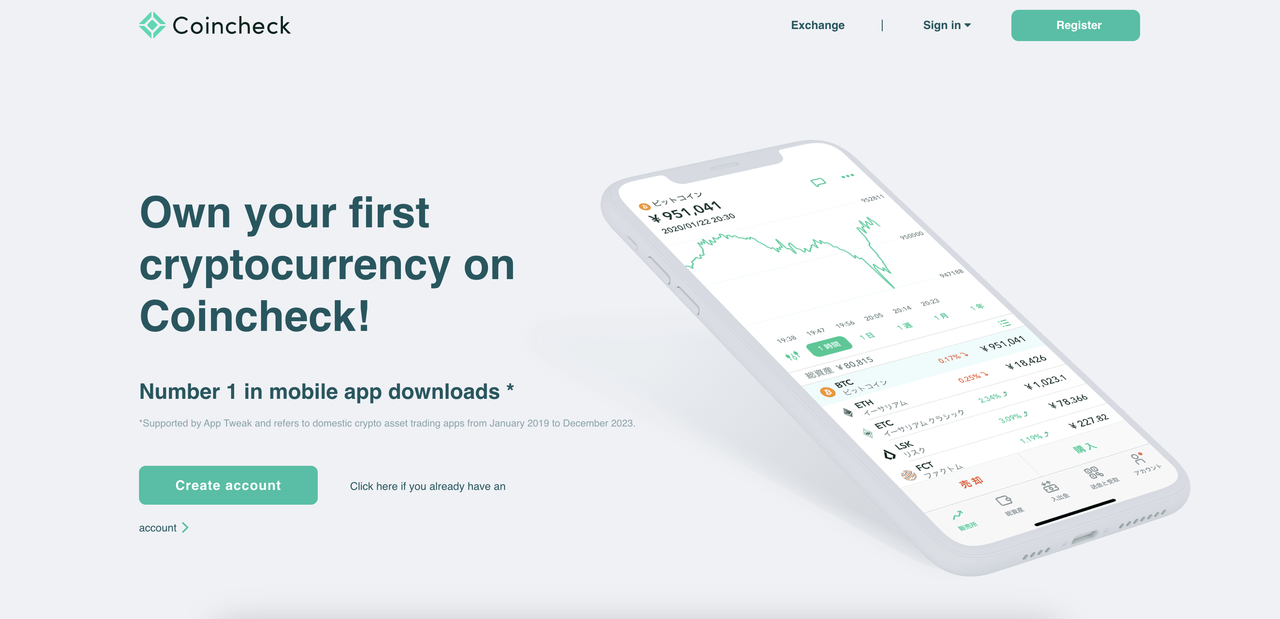
Established in 2014, Coincheck is Japan's largest cryptocurrency exchange with over 2.5 million users. In 2018, it was acquired by the Monex Group, a financial services company established in 1999, which operates a diverse range of businesses including online brokerage, asset management, and cryptocurrency services.
Coincheck offers a diverse range of cryptocurrency trading services, attracting a large number of local and international users. With its user-friendly interface and the advantage of no trading fees, Coincheck has become one of the most popular trading platforms in Japan.
Bitflyer Popular for Advanced Trading Tools

Bitflyer is known for its advanced trading tools and features, with the highest Bitcoin trading volume nationwide. It cleverly meets the needs of different user groups, from beginners to experienced traders, by providing two tailored trading experiences: the intuitive bitFlyer exchange for beginners and the advanced BitFlyer Lightning for more complex trading strategies.
BitFlyer has expanded its appeal through innovative features, including unique cryptocurrency credit cards, opportunities to earn BTC, and the Bitcoin T-Point exchange. These measures have solidified BitFlyer's reputation as the third-ranked cryptocurrency trading platform in Japan, while also catering to the accessibility and depth of a wide range of investors.
Bitbank has the highest rating in the app store
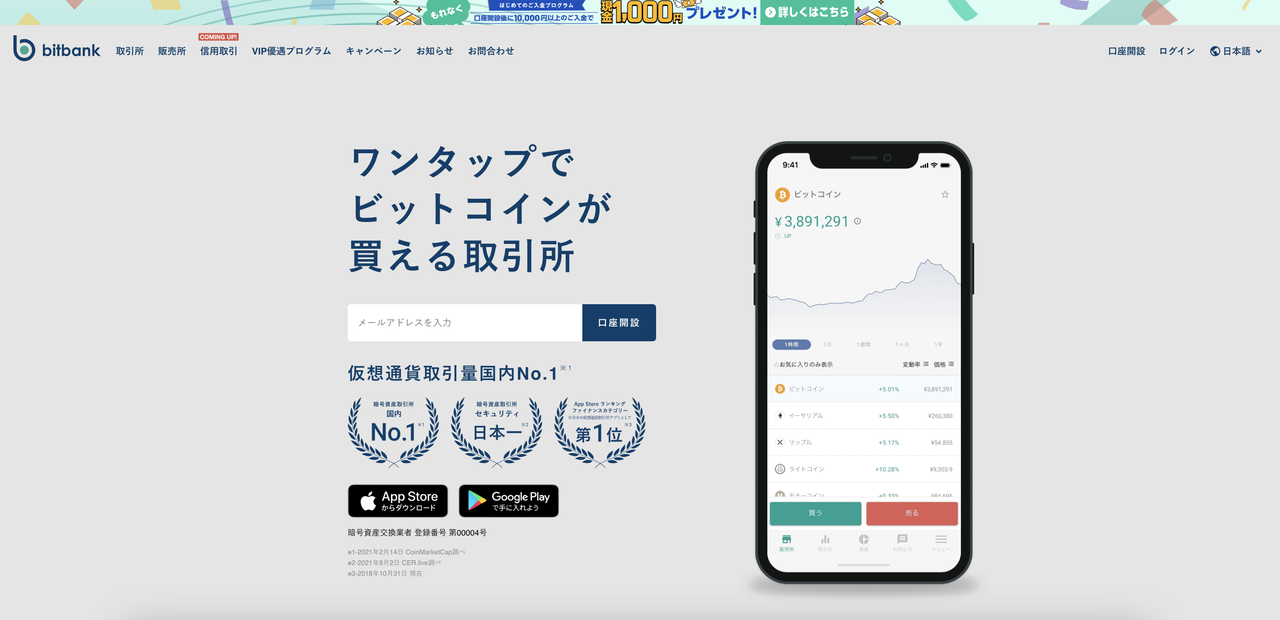
Bitbank is the cryptocurrency trading app with the highest rating in the Japanese Apple App Store and is one of the few digital asset exchanges in Japan that offers instant account verification services, typically completing verification within minutes.
In addition to trading functions, Bitbank also offers lending services, allowing users to lease assets to Bitbank with a return rate of up to 3%. Third-party institutions have highly praised Bitbank's security performance. The platform employs offline cold wallets and Multisig technology to ensure resilience against hacker attacks and protect users' asset security with advanced technology.
Zaif is known for privacy and security
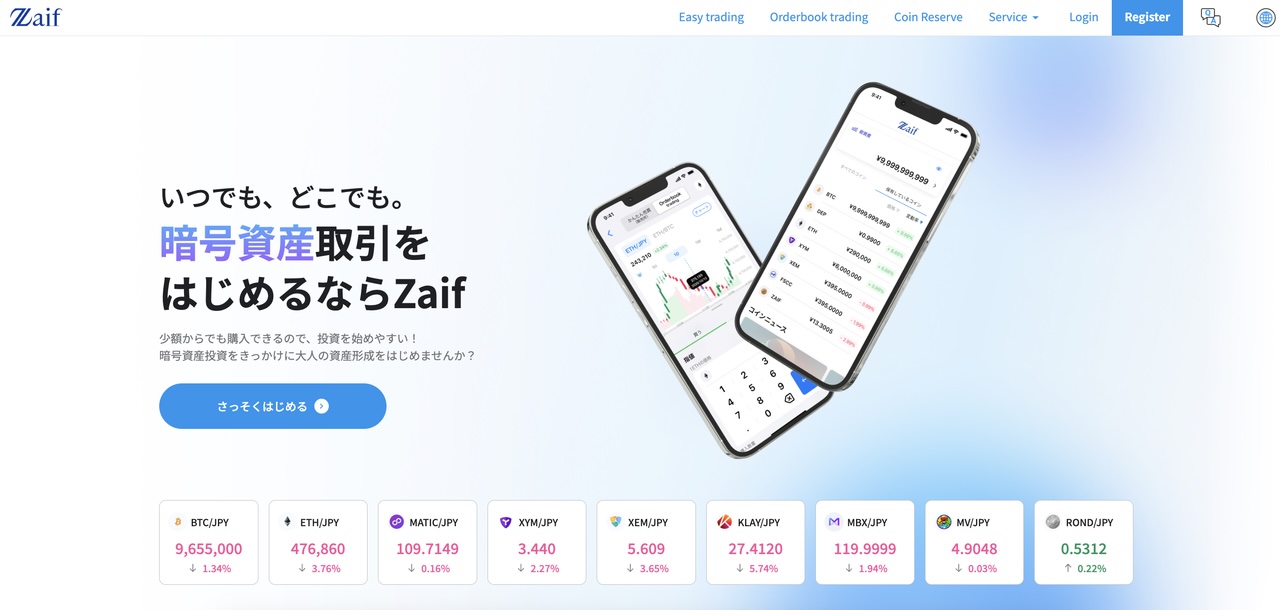
Zaif has over 500,000 users. Established in 2014, the platform offers a variety of cryptocurrencies, including Bitcoin, Ethereum, and others. Known for its focus on privacy and security, Zaif attracts traders who prioritize these features.
It allows users to buy and sell various cryptocurrencies with Japanese yen and also permits margin trading, making it suitable for beginners and those looking to trade quickly. Since its inception, Zaif has been in a continuous process of development, adding new features such as trading, payment services, and currency reserves.
5. Web3 Projects in Japan
The diversity of project types in the Japanese cryptocurrency market is relatively low. While there are public chain and DeFi projects, the main focus is on non-fungible tokens (NFTs) and gaming projects, which largely emphasize localization and long-term community building.
Japan Open Chain
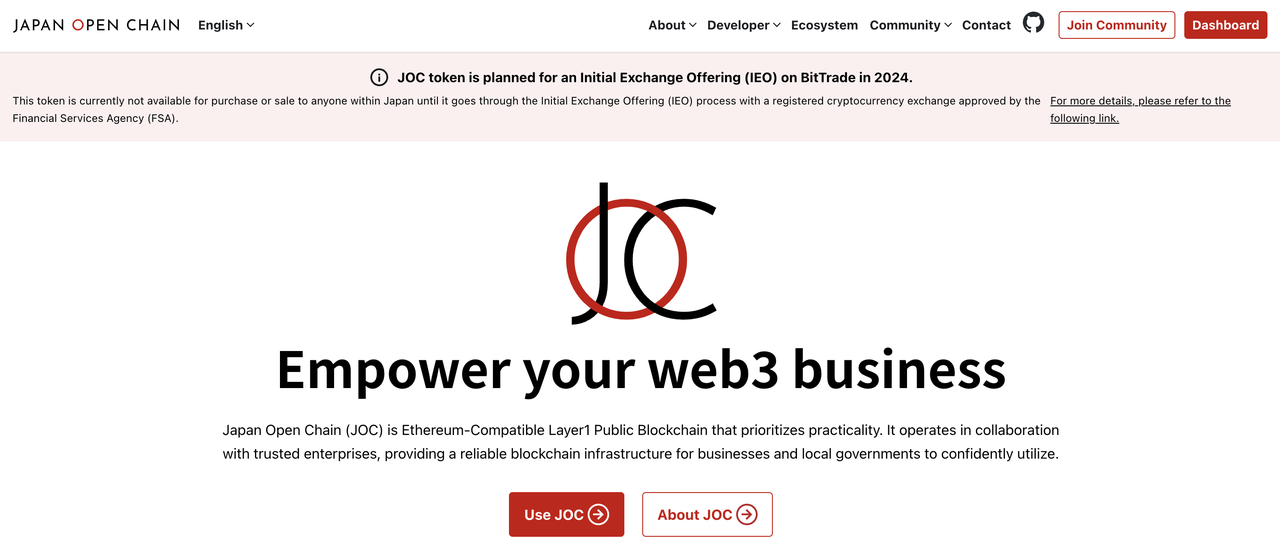
Japan Open Chain (JOC) is a practical Ethereum-compatible Layer1 public chain that collaborates with trusted enterprises to provide reliable blockchain infrastructure for businesses and local governments. Japan Open Chain is a blockchain infrastructure operated by a Japanese company in compliance with Japanese laws, providing a secure environment for developing web3 businesses.
INTMAX

INTMAX is a new type of zkRollup, serving as an Ethereum L2 network suitable for various web services and finance. It will enable Ethereum to allow all online citizens to participate in the economy through payment infrastructure and internet-native ownership of NFTs and community management tokens. INTMAX has made significant innovations in ZK implementation, making it a unique Layer2 rollup network with low cost, security, adjustable privacy, and most importantly, scalability.
HashPalette
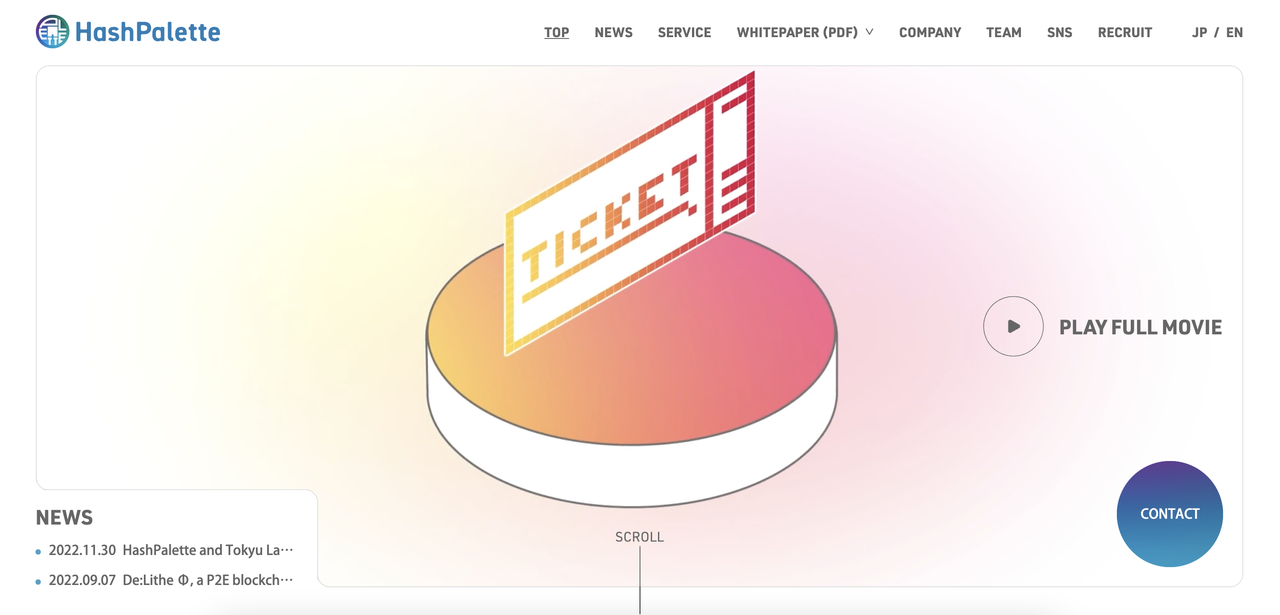
Palette is a blockchain network for issuing, managing, and distributing digital items. Users can freely transfer ownership of digital items and use them in applications. Palette allows digital projects to be treated as NFTs on its own blockchain, Palette Chain. Palette Chain is designed specifically for the issuance, management, and distribution of digital items in the entertainment sector, aiming to adapt to business models. Additionally, Palette Chain can connect to multiple blockchains, including Ethereum, and can serve as a cross-chain platform for NFT issuance and distribution.
Hashport

HashPort is a cross-chain interoperability layer that supports fast and secure cross-network transfer of digital assets, developed and provided by the eponymous HashPort Corporation, established in 2018 with the vision of digitizing assets and providing blockchain technology consulting and solution services to clients.
KEKKAI

KEKKAI is a Web3.0 security plugin that detects dangers through transaction simulation analysis, aiming to eliminate fraudulent activities in the growing Web3 field. Users who use KEKKAI can obtain risk assessment information in transactions—if there are anomalies, KEKKAI will display risk alerts on the page.
Murakami Flowers

Takashi Murakami is a renowned Japanese artist known for his colorful works and unique artistic style. The Murakami.Flowers project (M.F), initiated by Takashi Murakami, is a comprehensive project covering art, design, and digital creation. The project is centered around the digital "108" (composed of 108 backgrounds and 108 small flowers), echoing the numbers related to afflictive obstacles or worldly temptations in Buddhism, signifying the artist's attempt to transcend worldly constraints through digital art.
Crypto Ninja Partners

The vision of the project is to establish a digital fashion brand and empower creators. The core concept of the project is "I GOT YOUR BACK," symbolizing MetaSamurai's commitment to supporting its NFT holders. The phrase "I GOT YOUR BACK" originates from a story of two people fighting back to back, protecting each other; the spirit of the samurai is to dedicate oneself to protecting the lord; loyal dog Hachiko waited for its deceased owner day after day for over ten years. These are the inspirations for MetaSamurai's work.
6. Cryptocurrency Venture Capital in Japan
Skyland Ventures

Skyland Ventures (SV) is a venture capital (VC) fund headquartered in Shibuya, Tokyo, focusing on seed-stage startup investments. As of 2022, it has invested in over 120 startups, primarily located in Japan. Starting from 2022, the fund targets equity/token investments in startups in the Web3 space (cryptocurrency, NFT, and blockchain). The fund's investments range from approximately $50,000 to $500,000 in the pre-seed stage and from $100,000 to $1,000,000 in the seed and later stages. Its founders are Max Kinoshita, Yonkuro Masanori Ikeda, and Yuan Xiaohang.
They have partnerships with Hash Global, OKX Ventures, Foresight Ventures, MH Ventures, and Generative Ventures.
Investment history:
- Raised a $4 million venture fund for seed-stage startups in 2012.
- Invested in 16 companies.
- Translimit (provider of BrainWars brain battle game, with 13 million global app installations and support from LINE and Braindots, with a total download count of 23 million)
- Hachimenroppi (provider of a fresh market supported by Recruit and Yahoo! Japan)
- Kaumo.jp / CuRAZAY.com (aimed at popular websites in Japan, with 4-5 million independent user visits)
Gumi Cryptos

This venture capital firm is a boutique early-stage venture capital firm based in Silicon Valley, with investments covering information technology, financial services, gaming, insurance, infrastructure, cryptocurrency, network security, blockchain, and fintech in the United States, Canada, Europe, Israel, East Asia, South Asia, and Southeast Asia, including Japan. Its co-founder is Zirui Zhang, and its managing partners are from Japan and China.
Some of its major investment projects include OpenSea, 1inch, and Lit.
CGV Fund

CGV is an Asia-based fund management company focusing on investments in crypto funds and crypto studios. CGV FoF consists of family funds from Japan, South Korea, mainland China, and Taiwan, with headquarters in Japan and branches in Singapore and Canada. Its founders are Steve Chiu and Kevin Ren.
They have partnerships with Waterdrip Capital, LK Venture, ZC Capital, Satoshi Lab, and Blockchain Founders Fund.
Some projects in their portfolio include AlchemyPay, Bitkeep, Metis, TheGraph, Avalon, Celestia, and recent Bitcoin ecosystem projects—Bitcoin wallet infrastructure UniSat, bitSmiley, and BTC second-layer network ZULU.
BDASH Ventures
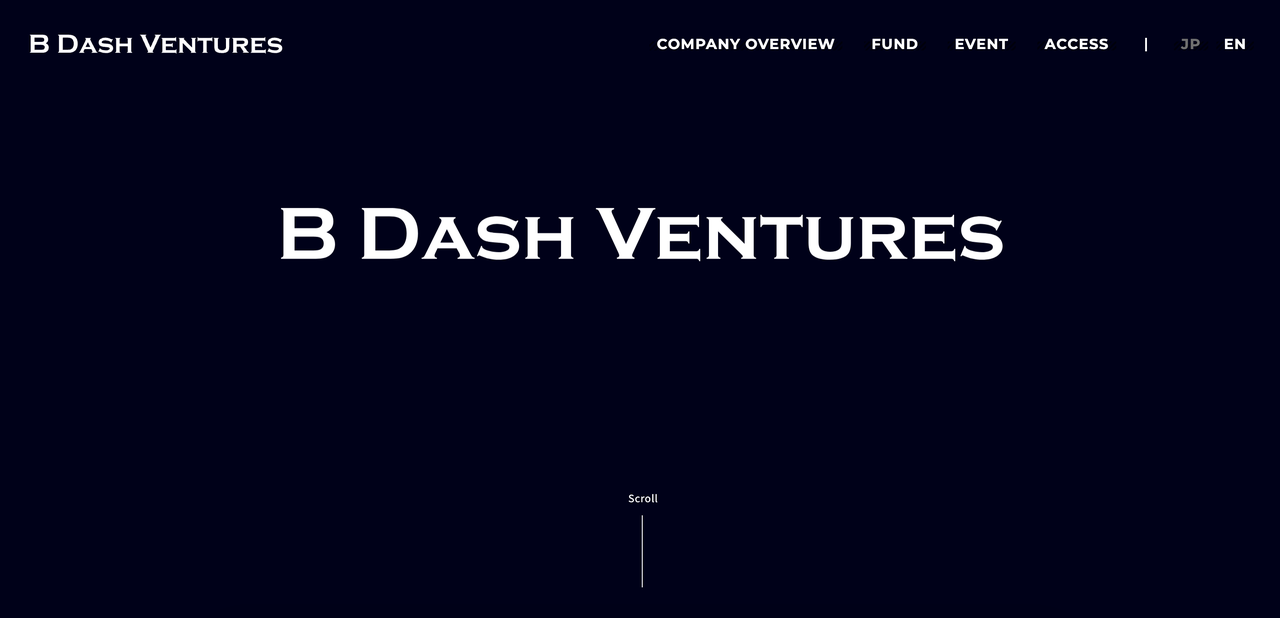
BDASH Ventures is a venture capital firm based in Tokyo, Japan, investing in seed, early, and later-stage startups that will become the core of the next generation of technology. The company's CEO is Hiroyuki Watanabe.
B Dash Ventures hosts a semi-annual summit for senior technology industry executives and startup founders called B Dash Camp, twice a year. It is now one of Japan's largest invitation-only tech events, attracting over 700 guests from Japan and abroad.
GMO AI&Web3
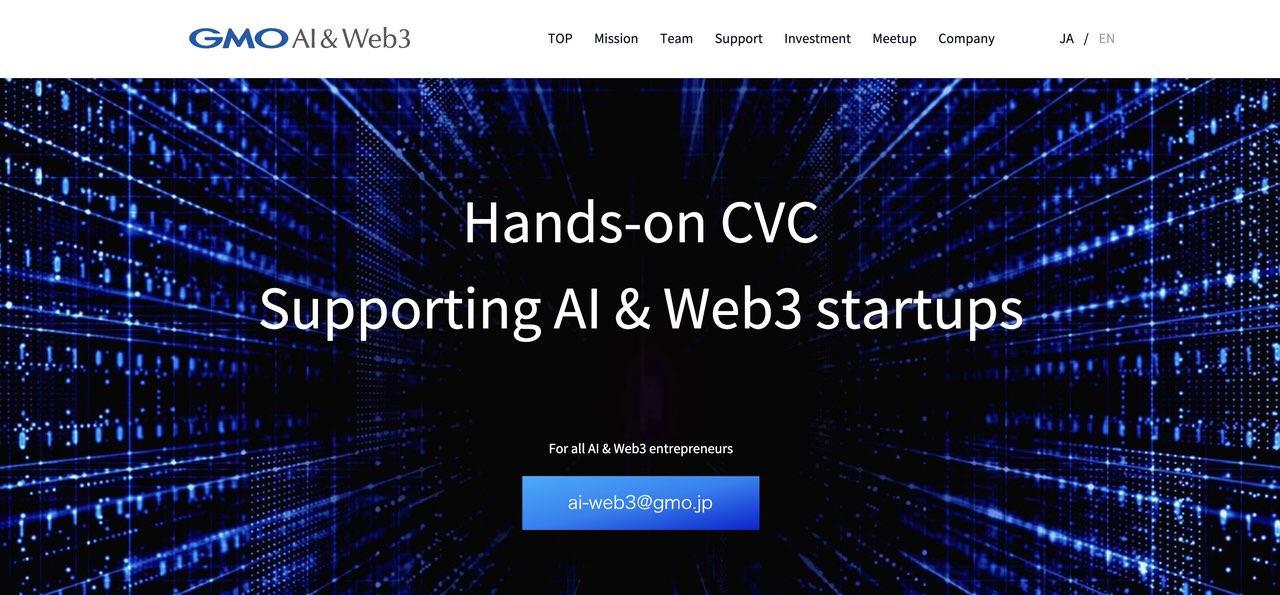
This cryptocurrency venture capital fund is part of GMO Internet Group Inc., a company listed on the Tokyo Stock Exchange. The group also includes GMO Coin, a licensed cryptocurrency exchange in Japan, listing 28 cryptocurrencies.
MZ Web3 Fund
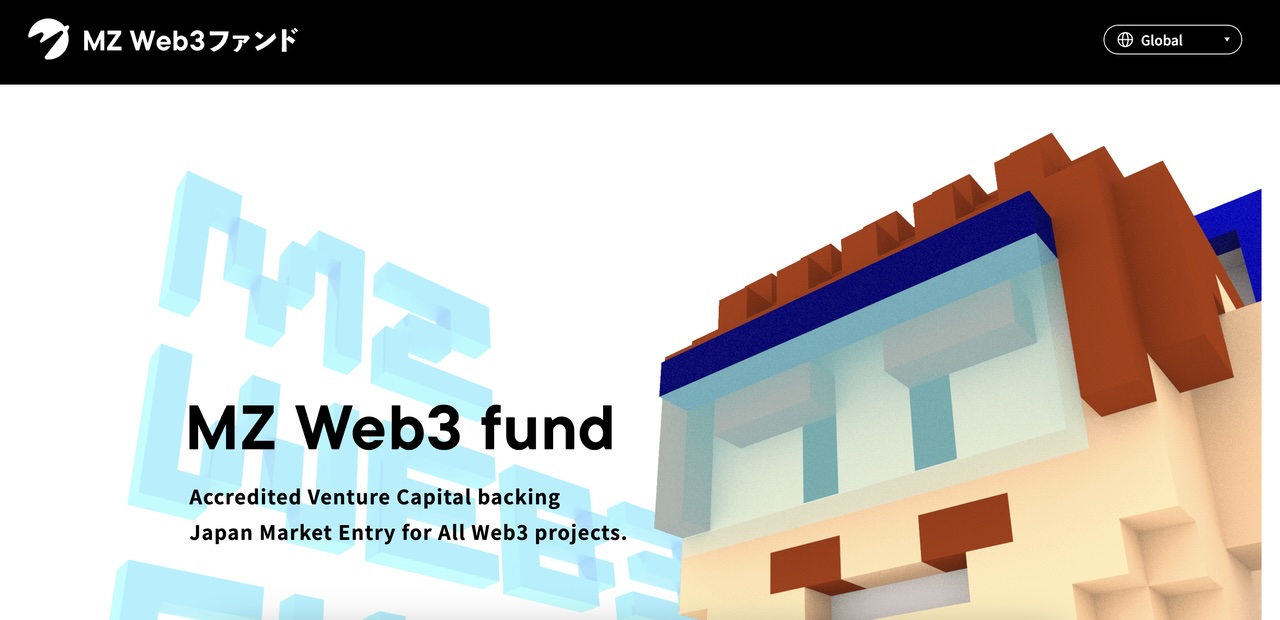
MZ Web3 Fund was established by Yusaku Maezawa, known as the Elon Musk of Japan, focusing on Web3 project investments and being the most active crypto fund in Japan. MZ Web3 Fund has invested in 24 startups in the Web3 space, including decentralized storage project SINSO, payment tool Slash and Transak, development community WEB3DEV, gaming public chain Oasys, and Web3 user growth platform Aki Network. MZ Web3 Fund will provide community resources through MZ Club and MZ DAO to help the invested projects expand rapidly in the Japanese market.
7. Cryptocurrency Market Regulation in Japan
In the global cryptocurrency market, Japan is a unique market with tremendous potential, particularly in the financial and investment sectors. However, due to frequent early attacks on the cryptocurrency market by hackers, the Japanese government maintains a conservative attitude towards the cryptocurrency industry and exercises cautious regulation. On the other hand, Japan's strong sense of crisis has led authorities to attempt to maintain the position of the world's third-largest economy by leveraging emerging technologies such as blockchain. Japan's regulatory policies in the blockchain industry appear mature and stable, creating a favorable environment for blockchain startups.
7.1 Legal Status of Cryptocurrencies
In 2016, the Japanese Cabinet passed an amendment to the "Payment Services Act," which came into effect in April 2017, providing a legal definition for cryptocurrencies and recognizing the legitimacy of cryptocurrencies. Under the "Payment Services Act," a digital currency meets all of the following criteria:
- Property value recorded electronically on electronic devices or other items using electronic methods
- Transferable using electronic information processing organizations
- Not a domestic or foreign currency or other currency-denominated asset
- Can be used by unspecified persons for purchasing, renting items, or receiving services
- Can be bought or sold to unspecified persons
In other words, Japan recognizes cryptocurrencies as a legal means of payment. The "Payment Services Act" is the world's first law to include digital currencies in the legal regulatory framework, which is of significant importance to the cryptocurrency market.
7.2 Tax Policies for Cryptocurrencies
In January 2022, Japan's ruling party, the Liberal Democratic Party, established the Digital Society Promotion Headquarters, and at the same time, the Japanese government launched the "National Strategy." Since then, its Web3 project team has been directly proposing legislative and regulatory reform suggestions to the ruling party. Many of these reforms have been adopted, but others remain pending.
In terms of corporate taxation, to promote a "token financing-friendly environment for companies," the Japanese Web3 policy team proposed two reforms. First, exempting "corporate income tax based on year-end market value for tokens held continuously by issuing companies"; second, exempting "tokens issued by other companies and held by third parties for purposes other than short-term trading." The first reform took effect in June 2023, and the second reform has just been proposed by the FSA to be included in the 2024 legislative agenda and has been approved by the Ministry of Economy, Trade, and Industry (METI). Implementing these measures may alleviate the long-term disadvantage Japanese domestic corporate investors face compared to overseas investors who can rely on more favorable tax treatment.
In terms of individual taxation, income from cryptocurrency asset trading is taxed as "miscellaneous income," with a "minimum tax rate of 55%" when combined with income tax and resident tax. This tax is levied not only when the held cryptocurrency assets are exchanged for fiat currency but also when they are exchanged for other cryptocurrency assets, leading to a significant outflow of taxpayers and hindering tax reporting. The Web3 policy team proposed four reforms: first, a uniform 20% tax on cryptocurrency asset trading; second, taxing "gains and losses" only when converted to fiat currency, thereby exempting "cryptocurrency asset exchanges" from taxation; third, allowing individuals to carry forward losses for up to three years; fourth, applying the same tax rate to "cryptocurrency derivative trading." However, these reforms were excluded from the 2023 agenda, and it is currently unclear whether these proposals will be part of the 2024 legislative agenda.
7.3 Licensing System and Self-Regulatory Organization for Exchanges
According to the amendment to the "Payment Services Act," institutions engaged in cryptocurrency trading need to apply for a license from the Japanese Financial Services Agency (FSA) and be subject to its regulation. Generally, to engage in cryptocurrency trading in Japan, the following four basic conditions need to be met:
- Entity: Kabushiki Kaisha (stock company) or foreign cryptocurrency trading institution (with a place of business in Japan and a representative in Japan)
- Registered capital: Possessing a financial base, with registered capital of at least 10 million yen and positive net assets
- Corporate system: Having a corporate system that can appropriately and effectively conduct business (such as segregating user assets from company assets, establishing effective risk management systems, preventing risks such as hacking, system failures, money laundering, and terrorist financing)
- Compliance: Compliance with relevant laws and regulations, protection of user privacy, fulfillment of anti-money laundering obligations, and cooperation with inspections and investigations by the FSA
All tokens listed on compliant exchanges in Japan need to be approved by the Japan Virtual Currency Exchange Association (JVCEA), a process that takes at least 6 months to a year, which has led to a lack of vitality in the Japanese cryptocurrency market.
In addition to FSA regulation, to enhance the industry's credibility and transparency, protect investor interests, and promote the healthy development of the cryptocurrency market, Japan, with the approval and authorization of the FSA, established the Japan Virtual Currency Exchange Association (JVCEA) in April 2018, initiated by 16 licensed exchanges, for self-regulation. The association has formulated a series of self-regulatory rules and guidelines, including:
- Categorizing and managing the cryptocurrencies provided by exchanges based on factors such as security, liquidity, and transparency to determine their listing conditions
- Assessing the risks of exchanges and setting limits on leverage, margin ratios, and forced liquidation mechanisms
- Requiring exchanges to disclose trading rules, fee standards, and customer complaint handling methods
- Providing consumer education to increase awareness and risk awareness of cryptocurrencies
7.4 Rules for Cryptocurrency Issuance and Financing
In September 2019, the JVCEA issued the "New Token Offering Rules" and accompanying guidelines, allowing public issuance and sale of tokens for financing (IEO and ICO). This marked the first time Japan had established a clear regulatory framework for cryptocurrency issuance and financing. According to the rules and guidelines, to issue and sell tokens in compliance with Japanese regulations, the main requirements include:
- The issuer or underwriter must be a licensed exchange and report relevant matters to the FSA and the association
- The issued tokens must meet the association's standards for security, liquidity, transparency, etc., and pass the association's review
- The issued tokens must have a reasonable pricing mechanism and fully disclose relevant information to consumers
- The issued tokens must be sold out within a certain period, and the sales situation must be reported to the association
Currently, under the "New Token Offering Rules," the frequency of ICOs/IEOs in Japan is not high. On September 26, 2023, in order to improve the situation of IEOs, the JVCEA further released an initial proposal for IEO reform.
In summary, Japan is a country with an open and positive attitude towards blockchain technology and cryptocurrencies. It has established relatively comprehensive and clear regulations in terms of laws, taxation, licensing, and self-regulation, and continues to explore and innovate to adapt to the rapid changes and diverse applications of blockchain technology, aiming to secure a place in the global blockchain industry. For blockchain entrepreneurs, although Japan has a strong sense of localization, it still provides a good environment for the establishment and development of the cryptocurrency industry.
8. Conclusion
As early as 2017, Japan officially recognized BTC as legal tender, and in April 2023, the ruling party's Web3 project team released a white paper, indicating the government's increasing investment in the industry, making Japan's cryptocurrency market increasingly prosperous. However, restrictions such as the prohibition of direct token investment and the inability to launch token issuance projects internally in Japan have limited the development of DeFi-type projects and businesses in Japan, instead forming an industry characterized by NFTs and gaming.
In terms of compliance, Japan has strict laws and regulations in place to ensure market stability and the safety of investors' assets in the cryptocurrency field. However, the high cost of compliance and high tax burden have hindered the entry and development of projects. In particular, the lengthy approval process for token listings often leads people to believe that the market lacks vitality and lose confidence in this field, while also limiting the innovation and flexibility of enterprises, resulting in Japan's cryptocurrency industry lagging behind other countries.
With the penetration and development of the cryptocurrency industry globally, institutional investors in Japan have shown a strong interest in the cryptocurrency market and gained a clearer understanding of the industry's potential. The participation of institutional investors has brought more liquidity, stability, and credibility to Japan's cryptocurrency market, driving the development of the industry and attracting more interest from retail and institutional investors.
In the fluctuating regional competition in the cryptocurrency market, Japan has unique advantages in regulatory compliance, GameFi, and NFT fields, and its strong and sustained community is an indispensable tool for industry development. However, overly stringent tax policies and investment restrictions still pose strong obstacles to the rise and development of the cryptocurrency industry in Japan. If policies can be moderately opened under the premise of regulatory compliance, it would be more conducive to the establishment, innovation, and development of the cryptocurrency market. In particular, the combination of Japan's unique cultural characteristics and a strong financial system may have the opportunity to make it a global leader in the GameFi and NFT fields, leading the future of the global cryptocurrency industry.
免责声明:本文章仅代表作者个人观点,不代表本平台的立场和观点。本文章仅供信息分享,不构成对任何人的任何投资建议。用户与作者之间的任何争议,与本平台无关。如网页中刊载的文章或图片涉及侵权,请提供相关的权利证明和身份证明发送邮件到support@aicoin.com,本平台相关工作人员将会进行核查。



